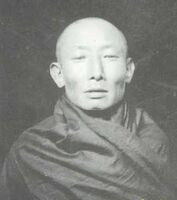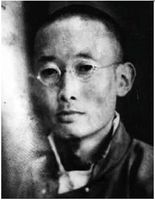Difference between revisions of "Chöpel, Gendün"
Jump to navigation
Jump to search
| Line 1: | Line 1: | ||
{{Person | {{Person | ||
| − | |||
| − | |||
| − | |||
| − | |||
| − | |||
| − | |||
|MainNamePhon=Gendun Chöpel | |MainNamePhon=Gendun Chöpel | ||
| − | |||
|MainNameTib=དགེ་འདུན་ཆོས་འཕེལ | |MainNameTib=དགེ་འདུན་ཆོས་འཕེལ | ||
|MainNameWylie=dge 'dun chos 'phel | |MainNameWylie=dge 'dun chos 'phel | ||
| − | | | + | |PersonType=Authors of Tibetan Works; Geshes; Translators |
| − | | | + | |images=File:GendunChopel.jpeg |
| + | File:Gendun Chopel.jpg | ||
|YearBirth=1903 | |YearBirth=1903 | ||
|YearDeath=1951 | |YearDeath=1951 | ||
| Line 18: | Line 12: | ||
|TolLink=https://treasuryoflives.org/biographies/view/Gendun-Chopel/3866 | |TolLink=https://treasuryoflives.org/biographies/view/Gendun-Chopel/3866 | ||
|tolExcerpt=Amdo Gendun Chopel, a twentieth-century philosopher-artist-historian, has emerged as one of the most controversial figures in the recent history of the Land of Snows. He remains to this day the most admired and loved writer and poet, bridging the divide between tradition and modernity. He traveled widely in India and the Himalayan region in the 1930s and 40s, encountering philosophers and revolutionaries and absorbing their ideas. His compositions, from descriptions of New York skyscrapers to brilliant commentary on Madhyamaka philosophy, are widely read. In the chaotic last days of the Tibetan state he was accused of being a Communist spy and was imprisoned in Lhasa, his unfinished Political History of Tibet destroyed, and his spirit broken. He died just weeks after the Chinese Communists arrived in Lhasa. | |tolExcerpt=Amdo Gendun Chopel, a twentieth-century philosopher-artist-historian, has emerged as one of the most controversial figures in the recent history of the Land of Snows. He remains to this day the most admired and loved writer and poet, bridging the divide between tradition and modernity. He traveled widely in India and the Himalayan region in the 1930s and 40s, encountering philosophers and revolutionaries and absorbing their ideas. His compositions, from descriptions of New York skyscrapers to brilliant commentary on Madhyamaka philosophy, are widely read. In the chaotic last days of the Tibetan state he was accused of being a Communist spy and was imprisoned in Lhasa, his unfinished Political History of Tibet destroyed, and his spirit broken. He died just weeks after the Chinese Communists arrived in Lhasa. | ||
| + | |pagename=Chöpel, Gendün | ||
| + | |HasDrlPage=Yes | ||
| + | |HasLibPage=Yes | ||
| + | |HasBnwPage=Yes | ||
| + | |namealt=Amdo Gendun Chöpel; Gendun Chopel; Amdo Gendun Chopel; | ||
| + | |AltNamesWylie=a mdo dge 'dun chos 'phel; | ||
| + | |AltNamesTib=ཨ་མདོ་དགེ་འདུན་ཆོས་འཕེལ་ | ||
|IsInGyatsa=No | |IsInGyatsa=No | ||
}} | }} | ||
Latest revision as of 14:57, 29 March 2023
དགེ་འདུན་ཆོས་འཕེལ
| Wylie | dge 'dun chos 'phel |
|---|---|
| English Phonetics | Gendun Chöpel |
Other names
- ཨ་མདོ་དགེ་འདུན་ཆོས་འཕེལ་
- a mdo dge 'dun chos 'phel
Alternate names
- Amdo Gendun Chöpel
- Gendun Chopel
- Amdo Gendun Chopel
Dates
| Birth: | 1903 |
|---|---|
| Death: | 1951 |
Tibetan calendar dates
About
Other Biographical info:
Links
- BDRC Link (P219)
- https://www.tbrc.org/#!rid=P219
- Treasury of Lives Link
- https://treasuryoflives.org/biographies/view/Gendun-Chopel/3866
- Wiki Pages
Buddha Nature Project
- Person description or short bio
Expand to see this person's philosophical positions on Buddha-nature.
| Is Buddha-nature considered definitive or provisional? | |
|---|---|
| Position: | |
| Notes: | |
| All beings have Buddha-nature | |
| Position: | |
| If "Qualified", explain: | |
| Notes: | |
| Which Wheel Turning | |
| Position: | |
| Notes: | |
| Yogācāra vs Madhyamaka | |
| Position: | |
| Notes: | |
| Zhentong vs Rangtong | |
| Position: | |
| Notes: | |
| Promotes how many vehicles? | |
| Position: | |
| Notes: | |
| Analytic vs Meditative Tradition | |
| Position: | |
| Notes: | |
| What is Buddha-nature? | |
| Position: | |
| Notes: | |
| Svātantrika (རང་རྒྱུད་) vs Prāsaṅgika (ཐལ་འགྱུར་པ་) | |
| Position: | |
| Notes: | |
| Causal nature of the vajrapāda | |
| Position: | |

